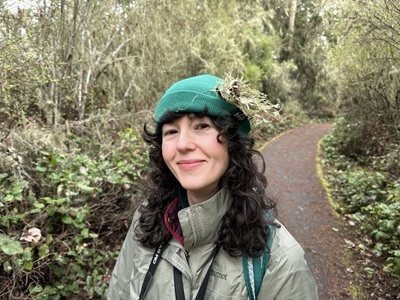
WPC Staff
Hannah Huber
Conservation Mycologist
Imagine being so passionate, so driven, so completely wild about mushrooms that you’d follow this advice: “You should give up whatever job you have and just quit. Just stop now, and devote the rest of your life to mushrooms.” Ironically, that message, touted often by Pittsburgh mycologist Gary Lincoff (1942 – 2018), led Hannah Huber to a job studying mushrooms.
Since 2023, Hannah has served with the Conservancy as a conservation mycologist, or scientist who studies fungi, with the Pennsylvania Natural Heritage Program. She is Pennsylvania’s first official state mycologist.
Thousands of fungal species grow in Pennsylvania, but no one knows yet exactly how many, says Hannah, noting that new species are discovered every year by academics and community mycologists alike. In addition to performing other important roles, fungi are the ultimate recyclers, breaking down organic matter to create fertile soil that plants and trees use.
The most challenging part of her job isn’t tramping around in soggy forests, but rather “getting a handle on the sheer diversity of fungi in Pennsylvania,” she says. She curates the list of fungal species—native or introduced mushrooms, lichens, truffles, microscopic fungi—and assesses the conservation status of species that appear to be rare. She’s also working on a fungal inventory project in old- growth forest patches on state forest land.
Historically, mushrooms have been dismissed and somewhat disrespected. “Until 1969, fungi were relegated as ‘lesser plants.’ Even still most academic institutions don’t have mycology-focused degree programs,” Hannah notes. Her own academic background is a bachelor of science, Integrative Studies in Biology & Environmental Science MPS Applied Ecology.
“In field mycology, most experts are not academically trained,” she says. The good news? Passionate people in mycology clubs participate in community science projects that generate data on which Hannah and other mycologists can rely!
Whether you’re interested in a career in mycology or just find fungi fun and fascinating and want to make a difference to support our natural world, Hannah says, “Join a mushroom club (or several!) and attend walks and forays! Learn how to recognize rare species. Find mentors and learn the funga of your region and continually monitor their populations.”
The following lists some of the ways you can volunteer at the Conservancy. We welcome volunteers to help in our community flower gardens, plant trees or maintain our preserves and trails, among other tasks. View a list of our current or upcoming volunteer opportunities and register for one today.
